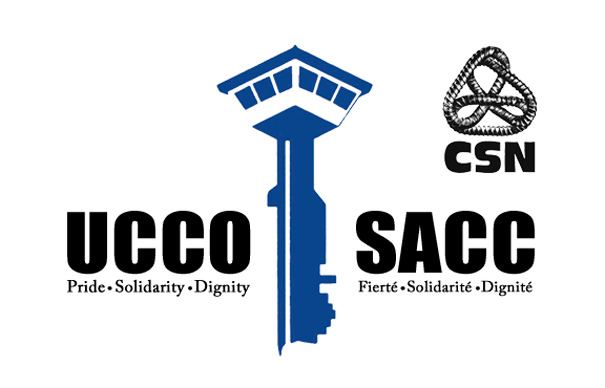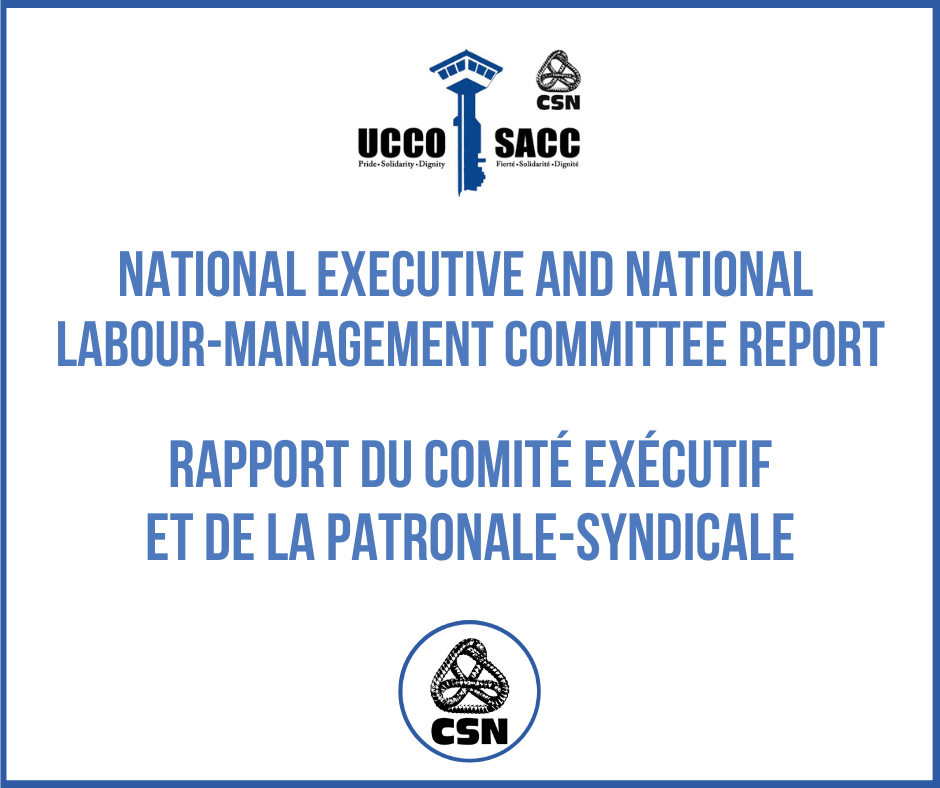The last month has been very busy for members of the National Executive. Since the end of February, two separate weeks have been devoted to productive negotiations with the National Joint Council, a CIPSRT mental-health symposium, the completion of the national audit, various meetings and tours with members of Parliament, and, of course, the National Labour Management Committee in the past week. Your Bargaining Committee once again invites you to follow the progress of negotiations by first familiarizing yourself on both union and employer demands. You can do so by clicking the negotiations tab located under the priorities tab on the website. Your Bargaining Committee would also like to remind all members to be vigilant regarding what they post on social networks. For obvious reasons, we never discuss tactics or engage in negotiations on these networks as the employer monitors everything we post. As a union, we strive to achieve the very best collective agreement for all members; however, social media – which is closely monitored by the employer – may be used as a demobilizing tool against the Bargaining Committee.
Institutional Violence
Regional and national action has been implemented and more initiatives are planned in an effort to raise awareness regarding the true nature of our work. The statistics speak for themselves. Correctional officer is one of the most dangerous occupations in the federal public service. Unfortunately, the Correctional Service and the government play down the daily violence we face. Correctional officers are threatened and assaulted: such violence is not – and can never be – a normal condition of employment. A 24-hour vigil will be held in Ottawa on April 28 in memory of our colleagues who have been injured or killed in the line of duty. Our employer must understand that violence is a direct result of poor management, insufficient inmate accountability, and a lack of equipment needed to deal with the rapid influx of drugs in our institutions. The legacy of this government and senior management will be one of mediocrity and a real lack of will to keep our members safe. This is an issue that we are pursuing rigorously both on and off the bargaining table as we seek to highlight the need for positive change in our working conditions.
Drones
Although the situation seems to be improving at some sites with temporary drone-detection equipment, we are still waiting for concrete mitigation measures. A few months ago, we submitted a report on the need for such measures at several sites across the country, but the report was shelved by the Commissioner and her team. The report indicated that the CSC must dedicate employee resources to monitor drone activity. The employer, however, wishes instead to analyze the funding which was made available years ago to deter throw-overs to determine if this funding is still relevant. The solution is a simple one: sites lacking technology or infrastructure to enforce the ban on drones should initiate a dedicated post to watch for drone activity. This low-cost solution would have a significant positive impact for both staff and inmate safety. The union’s analysis has been completed, and we are waiting for the employer to start consultation on these positions.
National Drug Strategy
At our meetings, the CSC informed us that the number of overdoses has doubled since last year. The opioid crisis is still raging across the country, as we are seeing more and more deadly and highly addictive drugs enter our communities and facilities. The CSC informed the National Executive that it will be amending CD 585 and seeking improvements to the National Drug Strategy. Local and regional executive committees are urged to take part in any consultation in connection with this strategy. Drug-free workplaces would see a great reduction in violence and crime, and our working conditions would be improved. This local and regional consultation is supposed to take place before the official national call for consultation is sent to all CSC stakeholders. We need to inform our employer that the Prison Needle Exchange Program is not a solution for reducing drug use and possible overdoses. Real solutions need to be tabled and implemented to achieve any positive impact.
Medication Distribution Guidelines
During our meetings with the employer, we had an opportunity to meet with the new Deputy Commissioner for Health. For several years now, health has played an increasingly important role in our day-to-day work. Your Executive Committee has been and will remain steadfast in asserting that the distribution of medication is not the work of a correctional officer. While we continue to discuss the new medication-distribution guideline, we have reported many operational issues we are seeing with the over-prescription of drugs such as methadone, suboxone, and other DOT medications. Physicians and the health-service sector as a whole must understand the unique environment in which we operate. Community standards need to be closely examined within institutions, as security should be foremost in the minds of all staff members. We have also expressed serious security concerns relating to diversion, in response to the growing reluctance among health-service personnel to report the diversionary tactics employed by the inmate population. We all have a role to play in preventing diversion and improving safety of all those working and living inside our institutions, including health services.
Local Elections
Local elections are now almost 100 percent completed. We would like to welcome all the new members who have taken up positions in their locals. The beauty of UCCO-SACC-CSN has always been and will continue to be that we are a correctional-officer union for correctional officers. For all members who decided not to run in this election, please support your new executive committees – our strength is in our unity! While there are many different roles to perform in our great union, at the end of the day we are all correctional officers working to defend and improve our own working conditions at the local, regional, and national level. A special thanks to all those who have risen to the occasion and defended our members’ common interests. Currently, your National Training Committee is working to schedule training sessions in each region, and we hope to have sessions completed before the summer period.
Security bulletin – Use of Firearms During an Escorted Temporary Absence
Our employer has released a Security Bulletin on the Use of Firearms During an Escorted Temporary Absence, which has a massive effect on our day-to-day operations as Correctional Officers. Although this document was consulted upon nationally and some minor changes were made, we do not agree with the direction the service is giving. As peace officers we feel that this bulletin jeopardizes public safety and the ability to effectively do our jobs. We feel that the employer’s interpretation of the Criminal Code and the CCRA are incorrect and is another knee jerk reaction. The National Executive will continue to have discussions on this topic, to help educate the employer on what we feel is an incorrect interpretation of the CCRA and the Criminal Code.
In solidarity,
Your National Executive

